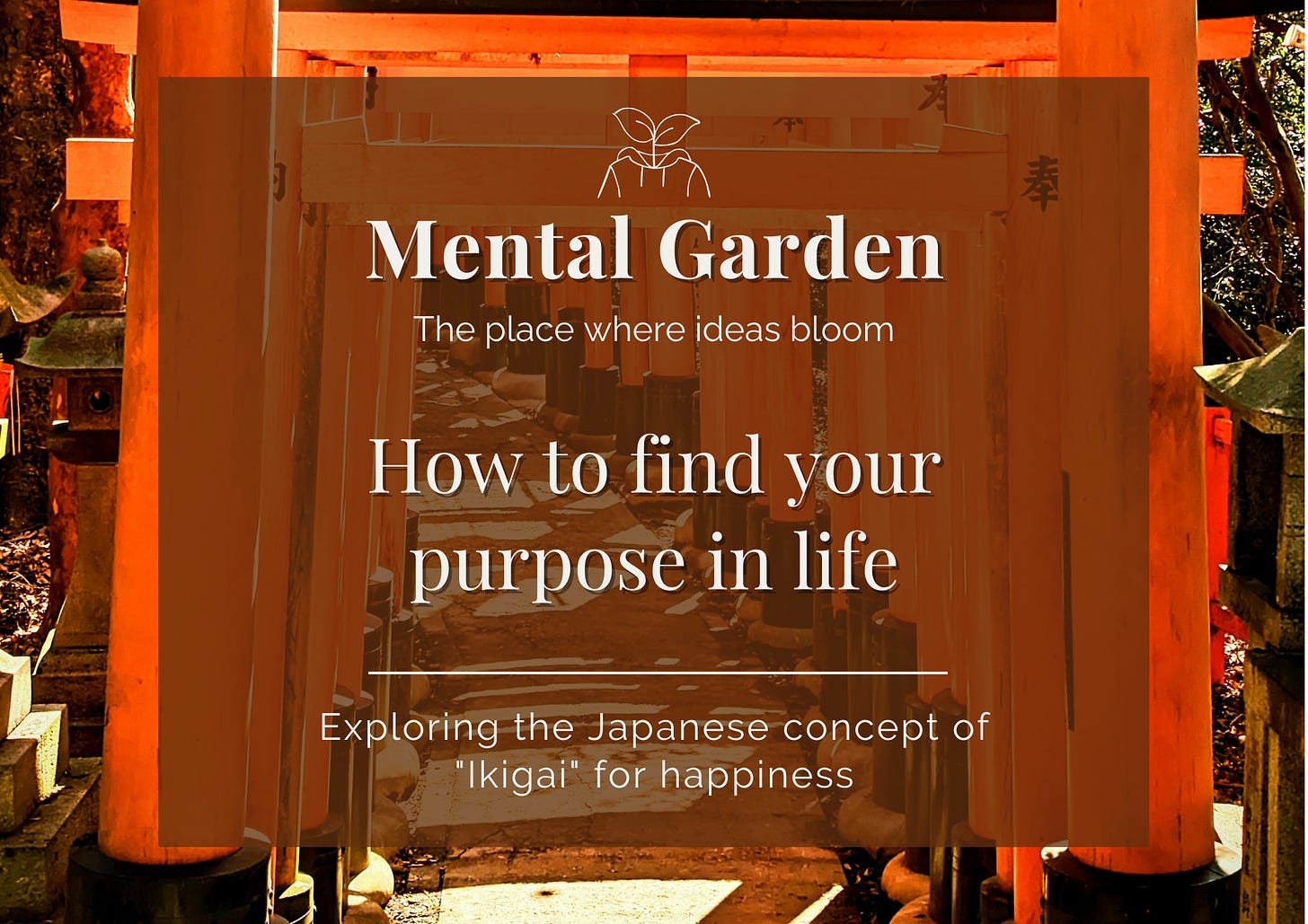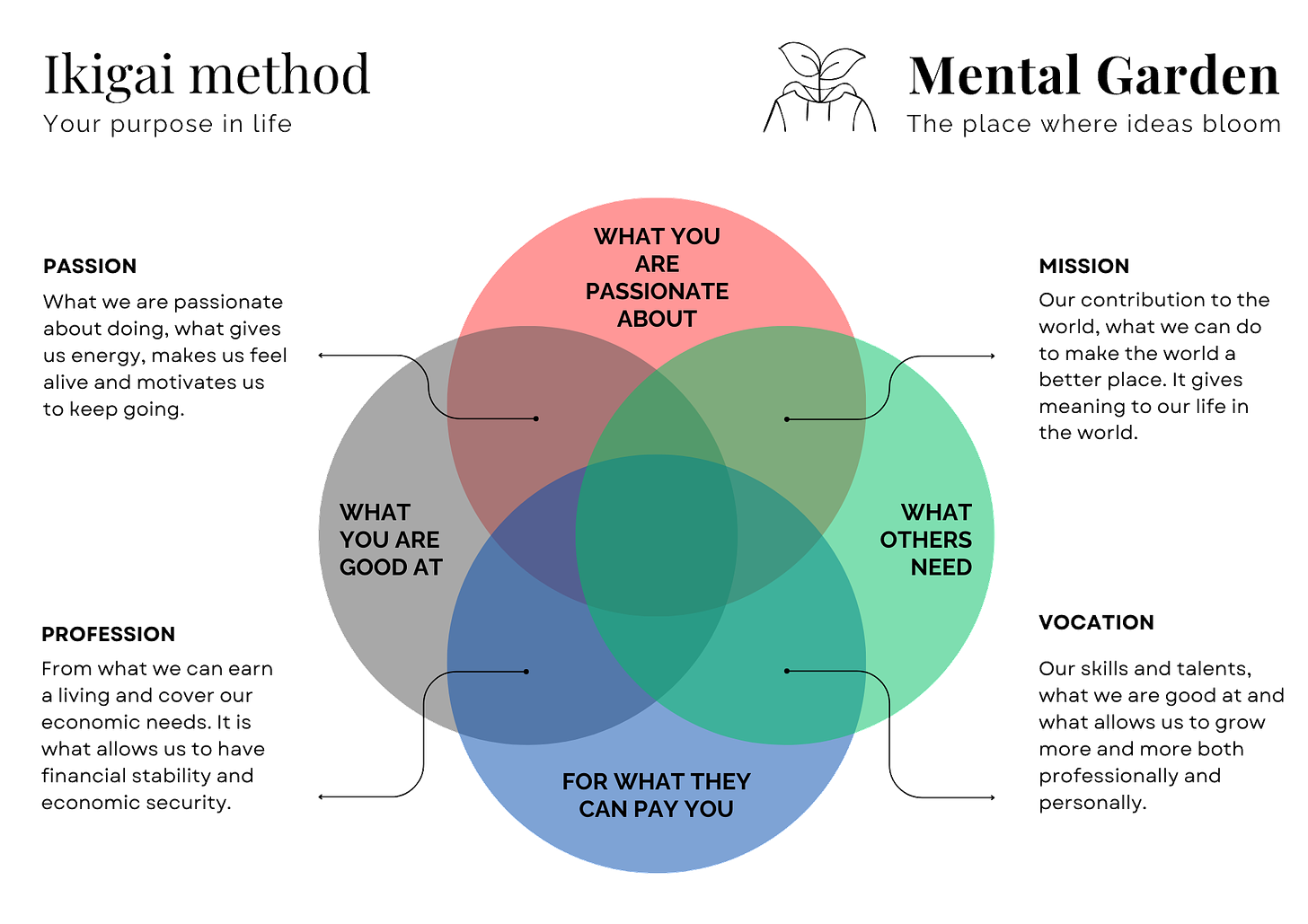🏷️ Categories: Happiness, Motivation, Goals
We can't be happy if we expect to live all the time at maximum intensity. Happiness is not a matter of intensity, but of balance, order, rhythm and harmony.
~Thomas Merton, 1955
Hey, how are you doing?
I recently shared a Japanese concept that was very eye-opening for me and made me rethink the way I approached the challenges and opportunities that arose in my life. Over here you have the text in which I talked about Ichi-go Ichi-e (一 期 一 会).
The idea inspired me so much that it led me to delve deeper into Japanese culture until I came across the concept of Ikigai (生き甲斐), translated as "the purpose of living." It's a powerful and intriguing idea that helps us find our purpose in life. If you want to get to know yourself a little better, join me as we explore how to find our own ikigai.
Find your ikigai
Ikigai is the balance between what we love, what we are good at, what others need, and what we can be paid for. From the combination of these parts, intermediate points emerge, which are those aspects that define us (passion, mission, profession, and vocation). Ikigai lies right in the center.
To find your ikigai, grab a pen and paper, and in 4 steps, we'll have it!
1. What you're passionate about: Start by writing down what you love to do, for example: painting, running, writing, taking care of animals...
2. What you're good at: Write down what you're good at. Sometimes what we like isn't what we excel at... (like painting for me 😅). If they match, that's our passion. For example: I like painting, but even though I try hard, I struggle to progress. However, in other things, I advance quickly and I love them too.
3. What you can be paid for: There are things you're good at, and among those, there will be many that can earn you money. That's your profession. It's what guarantees us financial stability.
4. What others need: The world demands solutions, think about how you can contribute your grain of sand, that's your vocation. You get paid for it and it fills you to do it even if it's not the highest-paying job or your talent.
Having made these 4 lists, you now have the last part, what you're passionate about and improves the world regardless of money. It's your mission in life. Think about those who collaborate with charities, Red Cross, NGOs, etc. That's exactly the case.
The key is balance
As you can see, the intersection of the 4 aspects gives us our ikigai. It has to be something intermediate for self-realization to exist. Imagine something you're good at, you get paid for it, and it improves the lives of others, yet deep down you don't like it. That's not going to work; maybe in the short term, but you'll end up feeling that your life is incomplete. This is why people abandon their careers or leave the job they had been preparing for.
Also, don't think that this balance is fixed; throughout your life, you'll have more than one ikigai. Over the years, you'll discover new passions, skills, and ways of living life that will change your perspective and lead you to a new ikigai.

Unexpected story of satisfaction
Did you know that bricklayers are among the workers who feel most satisfied with themselves? This is due to the immense satisfaction they feel when they see how their work transforms the world; they are building homes for people. Besides, they are constantly learning; the skill of a bricklayer is given by years of experience; there are many skills and materials to master. The trade is also changing and requires cooperation; each construction is unique, and only if everyone contributes their bit will they manage to build a beautiful building (Cabanes Rubira, 2011).
I loved the response given by a bricklayer interviewed in a study: "[...] with my hands, I do everything: I go and chip, install, plaster, put up drywall, paint... I do everything. I'm always on the front lines." (Interview No. 6) (Cabanes Rubira, 2011).
Why you should seek your ikigai
It's clear that it will help you find what to do with your life, but it will also benefit you in other aspects. It has been seen to be beneficial at the psychological and physical level, increasing life expectancy and providing greater well-being in older adults (Kotera et al., 2021; Harvard Health, 2020; Sone et al., 2008). As you can see, finding this balance will ensure you have a fulfilling life.
📚 References
Cabanes Rubira, I. (2011). Estudio de la satisfacción y motivación de los albañiles [Trabajo de fin de grado, Universidad Politécnica de Valencia]. http://hdl.handle.net/10251/12595
García, H. & Miralles, F. (2016). Ikigai. Los secretos de Japón para una vida larga y feliz. Urano.
Harvard Health. (2020, 1 abril). Finding meaning in life could improve your health. https://www.health.harvard.edu/mind-and-mood/finding-meaning-in-life-could-improve-your-health
Kotera, Y., Kaluzeviciute, G., Garip, G., McEwan, K., & Chamberlain, K.J. (2021). Health benefits of ikigai: A review of literature. In Y. Kotera & D. Fido (Eds.), Ikigai: Towards a psychological understanding of a life worth living. Concurrent Disorders Society Publishing.
Sone, T., Nakaya, N., Ohmori, K., Shimazu, T., Higashiguchi, M., Kakizaki, M., Kikuchi, N., Kuriyama, S., & Tsuji, I. (2008). Sense of Life Worth Living (Ikigai) and Mortality in Japan: Ohsaki Study. Psychosomatic Medicine, 70(6), 709-715. https://doi.org/10.1097/psy.0b013e31817e7e64
Merton, T. (2005). No Man is an Island. Shambhala Publications. https://archive.org/details/nomanisisland0000thom/mode/2up. Originalmente publicado en 1955.









I really enjoyed reading this, and it looks like I could use this guide as a journaling exercise. Thanks!
I am doing just the things you suggested! I am house sitting for a friend, taking care of a dog, cats, chickens and greenhouse full of plants. It brings me joy, and is important work. I love the variety of health coaching, mentoring, elder companion, cooking and house keeping, and more recently, writing here on Substack. I promote all of them with my business~ Joyful Solutions. Very satisfying work. Thank you for your article! I learned something new!